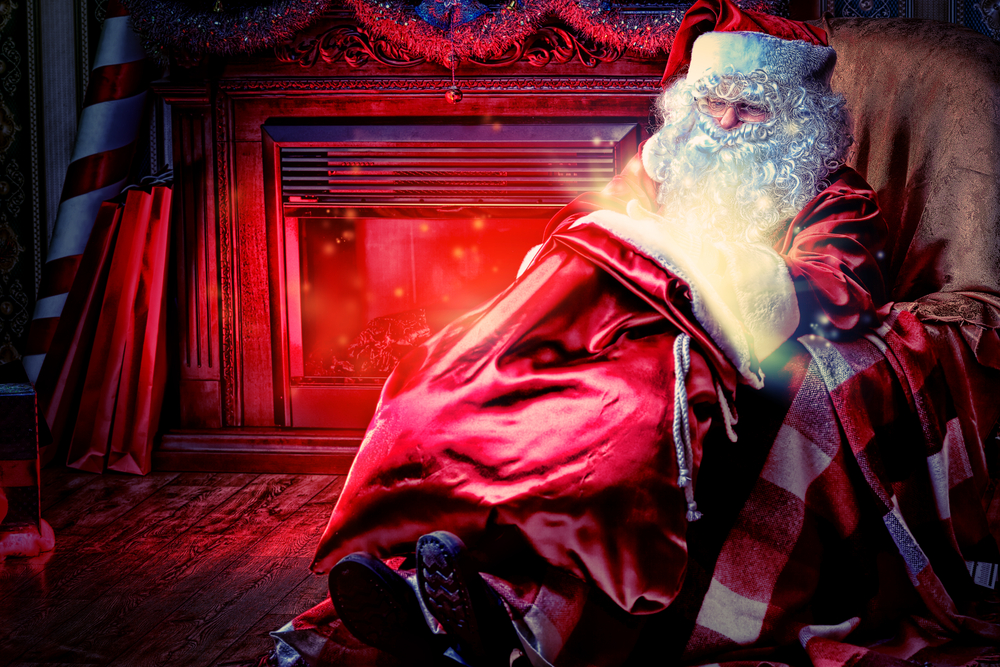Kids' Belief in Santa Myth Is Healthy, Psychologists Say

Spoiler alert: This article contains information suggesting Santa Claus may not be real.
Generally, lying to kids is a bad thing. But for many children, believing in Santa is a normal and healthy part of development, psychologists say.
The notion of a man who flies around the world in a vehicle drawn by flying hoofed mammals, entering people's homes through their chimneys and delivering presents, all within the span of a single night, is highly improbable, to say the least. Yet the Santa Claus myth is a long-standing and powerful tradition for many families, and may reinforce good values.
"I don't think it's a bad thing for kids to believe in the myth of someone trying to make people happy if they're behaving," said Dr. Matthew Lorber, a child psychiatrist at Lenox Hill Hospital in New York City. "Imagination is a normal part of development, and helps develop creative minds."
Mythical story, real values
The Santa myth is grounded in truth — after all, St. Nicholas was a real person. He became famous for giving gifts and money to the poor, and it's those values that are important, Lorber told LiveScience. "It's a real story, it's a real value and it's something that inspires children," he said. That's the spirit of Christmas, though today's consumer culture may have drifted from that spirit a bit, he added. [10 Beasts and Dragons: How Reality Made Myth]
Santa Claus is just one mythical figure many kids believe in, along with the Tooth Fairy, the Easter Bunny and other fairy-tale creatures. Children use their imaginations all the time, even if they know the resulting creations are fiction. When kids play cops and robbers, they know they aren't really cops or robbers, Lorber said. In fact, psychologists worry about kids who lack the ability to write or tell creative stories, he said.
Get the world’s most fascinating discoveries delivered straight to your inbox.
The Santa story is also deeply embedded in popular culture, with Santa showing up at shopping malls and in plenty of TV shows and movies, said Stephanie Wagner, a clinical psychologist at the NYU Child Study Center in New York.
"I don't think we could necessarily say it's a good thing, but I would certainly say it's not harmful," Wagner told LiveScience. Christmas brings families together, and the Santa myth reinforces these bonds, she said.
The Christmas tradition also reinforces some positive habits, such as writing letters to Santa. Lots of kids don't like to write, but they'll make the effort to write these letters, Wagner said.
Breaking the hard truth
But like many good things, the Santa story eventually comes to an end. Kids stop believing in Santa at different ages. Often, a friend at school will break the news.
Kids will also try to figure it out for themselves, when they start to notice that the story doesn't quite add up. For instance, they might stay up late trying to catch Santa delivering presents. Questioning what's real and what's not is a normal part of mental development, Lorber said.
When children ask their parents whether Santa is real, parents need to decide whether the child really is ready to know the truth, Lorber said. The best way to handle that is to ask the child if he or she still believes in Santa. If they do, it might be too soon to tell them.
"I think most parents have a good feel as to when their children can accept the truth," Lorber said. When parents do reveal the truth, they can tell their kids that the spirit of Christmas is real, and tell them about the real St. Nicholas.
Some families will go to extreme lengths to ensure their kids continue to believe in Santa. Parents should ask themselves whether they're perpetuating the myth to make their child happy or merely for their own enjoyment, Lorber said.
Of course, many children grow up not believing in Santa, either because they don't celebrate Christmas or follow traditions of a different culture. And some families who celebrate Christmas don't raise their kids to believe in Santa, and that's healthy too, Lorber said. However, if that's the case, parents should make sure their kids know that other children believe in the story and tell them not to ruin it for others.
Santa may be a Christmas tradition. "However, the spirit of giving to poor and to the needy, and the spirit of family and being together — that is universal," Lorber said.
Follow Tanya Lewis on Twitter and Google+. Follow us @livescience, Facebook & Google+. Original article on LiveScience.

 Live Science Plus
Live Science Plus





